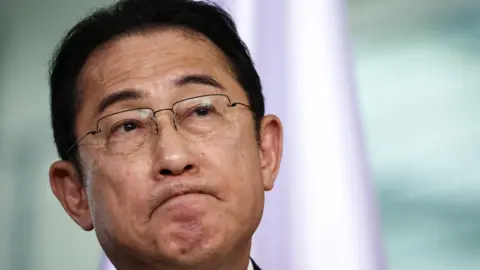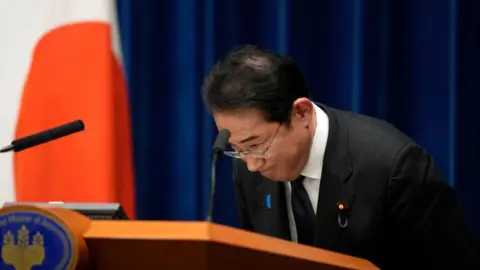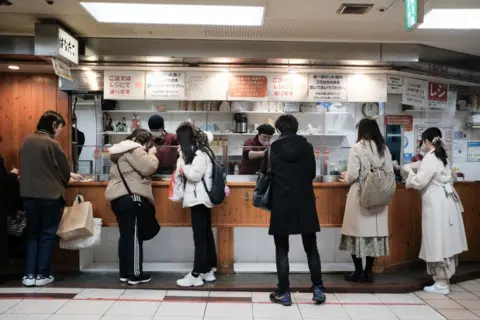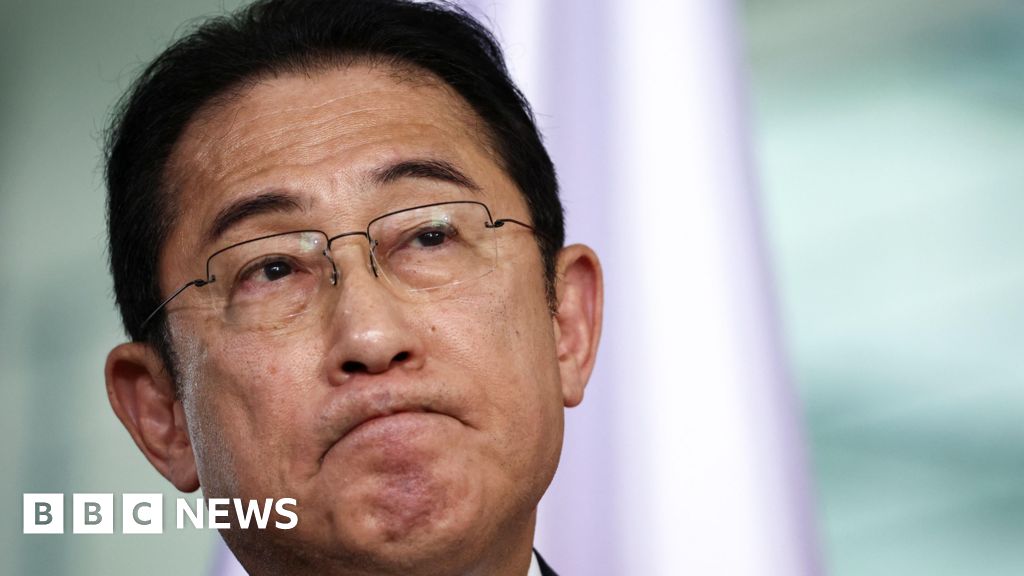 Reuters
ReutersIt’s been a cruel summer for Japanese Prime Minister Fumio Kishida.
A series of scandals that implicated the ruling Liberal Democratic Party (LDP), Mr Kishida’s closest allies within it and even his family had put his job on the line.
That this happened as living costs shot up and discontent simmered within the LDP did not help the embattled leader.
His approval ratings plummeted to record lows. Through it all a test loomed – the party leadership race that was slated for September.
Some observers said that he would fight for another term, but it was not particularly shocking when he announced that he was bowing out of the race for party president – it means he also won’t be prime minister come September when the LDP picks a new leader.
His diplomatic wins – an ambitious budget to expand the military, deeper ties with the US and a historic détente with South Korea – could not save him.
“The obvious first step to show that the LDP will change is for me to step aside,” the 67-year-old told a roomful of reporters on Wednesday in his usual unflappable manner.
Except for his words, everything else about him suggested it was business as usual.
Scandal after scandal
A political veteran, Fumio Kishida stepped into the top job in 2021. His predecessor Yoshihide Suga had resigned after just a year in office, following dismal approval ratings as Japan weathered one of its worst Covid waves.
A month into his term as PM, Mr Kishida led the LDP into a general election and emerged at the head of a winning coalition.
Those who know him well – and have worked with him – tell the BBC that he is a decent and intelligent man, and a fairly conservative politician. Others say he is a savvy strategist, who shouldn’t be written off easily.
Mr Kishida’s mild-mannered style belied the fact that he could also be unpredictable and stubborn. Take, for instance, his risky yet sudden decision to dissolve his own faction in the party, which led to others disbanding – these cliques, as old as the party itself, are a crucial source of patronage and money.
For months, observers had called his position untenable, partly because of the indecision with which he handled the controversies surrounding him. He held on, even as rebellion grew within LDP ranks. But the writing was on the wall.
“People are so tired now,” Hiromi Murakami, a political science professor at Japan’s Temple University, said weeks before Mr Kishida decided to step down. “It’s accumulating. It’s not just the fundraising scandal.”
The LDP began the year mired in controversy. In December, four cabinet ministers, including key allies of the PM, and several junior ministers had quit amid allegations that LDP leaders were pocketing millions of dollars in party funds.
An investigation by public prosecutors revealed more details, and the LDP eventually said 85 of its members had failed to properly report their income.
This just became the latest in a series of controversies that had marred his term: the year before, he had fired his son who was employed as his executive secretary after it emerged that he had misused his position to throw a party at a prime ministerial residence.
And the LDP was already reeling from headlines about its connections to the controversial Unification Church which was linked to the assassination of former PM Shinzo Abe.
 Getty Images
Getty ImagesAs 2024 dragged on, so did the fallout of all these scandals. And there were new ones.
In April, the LDP lost two seats in a by-election when lawmakers from the party resigned – one was accused of buying votes, and the other was implicated in the fundraising probe.
Then in July, the defence ministry was rocked by allegations of mishandling confidential and sensitive information, harassment of subordinates and fraud. A slew of disciplinary measures, suspensions and even dismissals followed.
By this time, the LDP’s approval ratings had hit rock bottom – 19%, its lowest since 2000, according to a survey by the daily Asahi Shimbun.
(Mis)managing the problem
Mr Kishida vowed to tackle the crisis “head on”, but the way he handled it became part of the criticism too.
There was the rare appearance in front of the political ethics committee, but he seemed unsure and was reluctant to say much.
In June, his coalition ushered through reforms in election funding, but it was met with public scepticism. “Nothing came out of it although they spent so much time on it. It was too late, he should have done something earlier,” Prof Murakami said.
Also in June, he tried to appease disgruntled voters and ease the impact of inflation with a temporary tax relief scheme. But people didn’t seem to think that went far enough.
“It has been constantly tense… I’ve found myself grappling with many issues both at home and abroad,” is how Mr Kishida assessed his tenure at the end of June, when he reached the 1,000-day mark.
June was also when there were rumblings about “post-Kishida” candidates – loud enough to make it into the national media – as dissatisfied party colleagues feared having an unpopular leader on the PM ticket ahead of next year’s general election.
“[They] think if he’s at the helm, they’re going down. They’re in panic mode,” Jeff Kingston, professor of Asian studies and history at Temple University, told the BBC at the time.
 Getty Images
Getty ImagesWhile there have been several corruption scandals before, this latest one came at a painful time.
“The economic situation affected people’s mindset,” Prof Murakami said. “People had suffered so much from the [Covid] crisis. They’re barely paying their bills. But now [they see] politicians that have chunks of money that they’re not going to pay tax for” – a reference to the LDP’s admission that some MPs had not reported their income properly.
While his popularity at home was nose-diving, Mr Kishida had done well on the international stage. He was Japan’s longest-serving foreign minister before becoming prime minister. As PM, he hosted the G7 summit last year, visited Ukraine and thawed relations with South Korea, a crucial ally against both China and North Korea.
Relations with Washington are as strong as ever. He addressed Congress earlier this year on President Biden’s invitation – and received a standing ovation.
“Thank you,” he told his audience. “I never get such nice applause from the Japanese Diet [parliament].
Back home, Japanese media slammed the visit, with one headline declaring “Kishida shouldn’t use the summit as a tool for domestic politics”.
If that was the aim, he didn’t succeed. Mr Kishida was swamped with fighting on so many fronts – and his party and voters ran out of patience.
“People vote on pocketbook issues,” Prof Kingston said. “Great that he is parading around Nato, the EU… and the United States. At the end of the day, I want to see more pay in my wallet.”
Mr Kishida said that the LDP needs a new start – and it needs to convince the Japanese people it can change.
The opposition is still too weak and divided to be a viable option, but there is a great deal of mistrust within the ruling party.
Can a different face at the top unite the Liberal Democratic Party and fix its tarnished image? September will tell.

